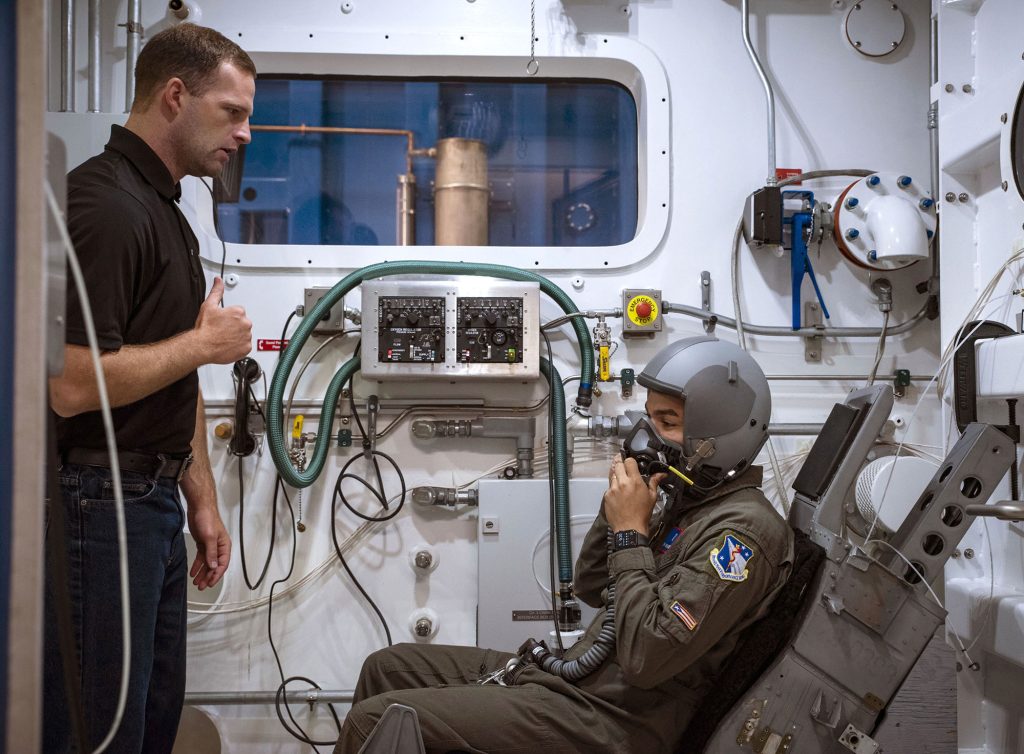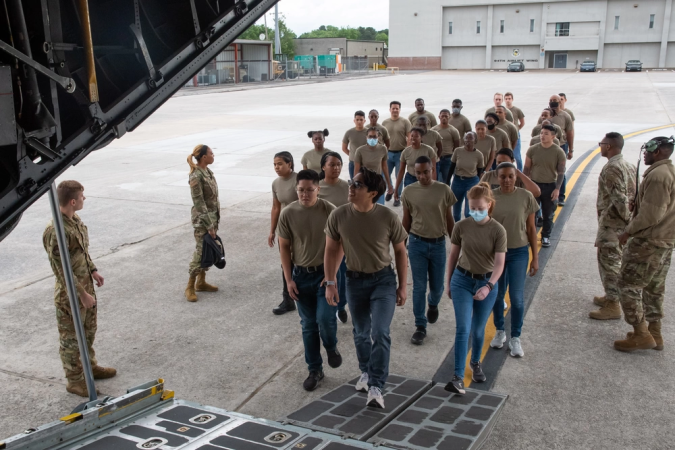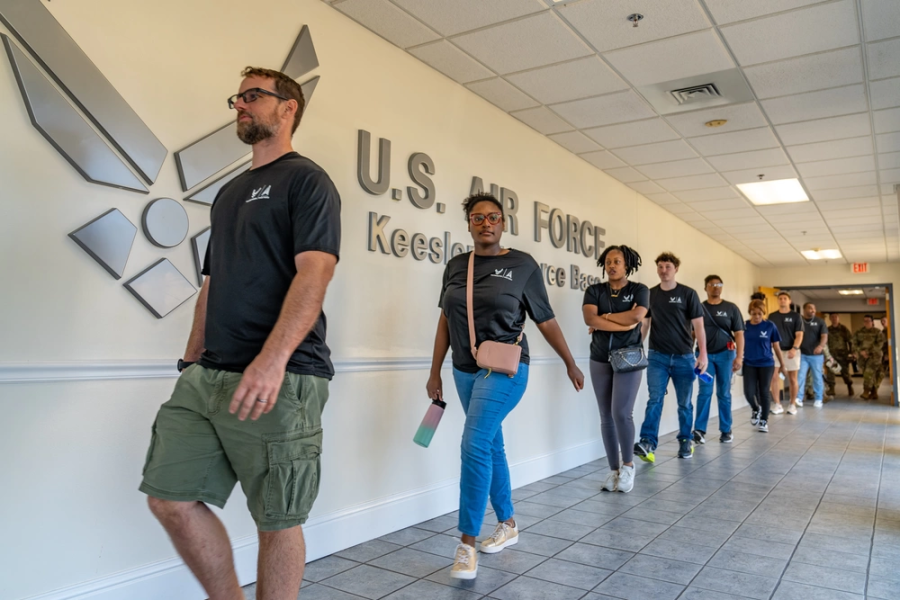In a bid to bring in more recruits, the Air Force recently expanded its waiver tolerances for asthma, food allergies, and hearing loss. The move should bring in between 600 and 1,000 more recruits per year, though they would have to stay out of career fields with stricter medical standards such as aviation and special warfare.
The Air Force Recruiting Service’s Accessions Medical Waiver Division is always looking for ways to expand its waiver tolerances, division head Col. Ian Gregory told Air & Space Forces Magazine. But the effort went up a notch after the Air Force missed its recruiting goals last year for the first time since 1999. Asthma, food allergies, and hearing loss are three areas with a high number of waiver requests and relatively low operational risk and additional medical support.
“We chose these three diagnoses because we wanted to get the most bang for our buck,” he said.
Assistant Secretary of the Air Force for manpower and reserve affairs (SAF/MR) Alex Wagner signed off on the changes Aug. 29, which were implemented Nov. 1.
Asthma
Before Nov. 1, if an applicant tested positive for asthma on a breathing test, that applicant would be disqualified, Gregory said. Now, if the applicant’s airways are still in relatively good function and they rarely have to use a rescue inhaler, they can join up as long as they don’t serve in career fields that could worsen their condition, such as firefighting.
The medical standards for retention are different. In the past, if an Airman or Guardian developed or discovered asthma after joining up, a medical evaluation board (MEB) decided if they stayed in.
Most of the time they did, Gregory said, but they could not be stationed in places that could exacerbate their conditions or where medical care could be more difficult to access, which can vary even within the continental U.S. (CONUS).
“It’s not just CONUS versus non-CONUS, it’s about how far away are you from getting to emergency medical support,” Gregory explained. “If you’re deep inside a bunker and have to go through multiple security protocols to get to emergency services, that could be a challenge.”
Now Airmen with asthma will get an assignment limitation code right at the start of their career.
“This is why we needed SAF/MR’s guidance and approval, because this is a drastic change in the personnel system,” Gregory said.

Food Allergies
The Air Force has a history of disqualifying applicants with food allergies, no matter the severity. That’s because the guiding light for most Air Force waiver decisions is whether an applicant can serve one deployment in a tour of duty–typically four years–without causing excessive stress to themselves or the mission.
A deployment can involve difficult climates, changing diet, stress, lack of hygiene, and harsh working conditions, all of which may have unpredictable health effects, including on food allergies.
“We have to explain to people that just because they have a well-controlled condition in the civilian setting doesn’t mean that it’s appropriate for the military environment,” Gregory told Air & Space Forces Magazine in March.
Under the new tolerance, applicants at risk of severe reactions such as anaphylaxis still can’t join. But if their reactions are mild, such as nausea, skin rash, or itching, they might receive a waiver. They may even be allowed to join if they have to carry an epinephrine injector—often called by its brand name, EpiPen—to treat accidental exposure.
“These people are still at risk, but it’s felt that the risk is acceptable,” Gregory said. “Thus far, we haven’t had too many problems with people who develop food allergies while on active duty, and they do deploy and carry an EpiPen.”
The risk profile could change as more people with food allergies come in, but Gregory anticipates there won’t be a big operational impact.
Hearing Loss
AFRS has a four-tiered system for evaluating hearing loss: mild, moderate, severe, and extreme. Generally, AFRS allows recruits with mild hearing loss, Gregory said. Now it will accept moderate hearing loss, as long as it is in only one ear and the loss is not caused by a tumor or some other dangerous condition.
“If they just have noise-induced hearing loss on one side, and their other side is acceptable, we will provide a waiver and then make sure they don’t go into a career field where they are going to be more at risk of hearing loss,” the colonel explained.
That means staying away from the flightline, explosive ordnance disposal, or other loud jobs. The key issue is to not make it worse; hearing loss and ringing in the ears are some of the top conditions that service members claim for Veterans Affairs disability payment upon leaving the military, Gregory said.
“Congress has mandated that we do as much as possible to decrease the amount of hearing loss that people have,” he explained. “We need to make sure that we’re not driving up more hearing loss to increase the payouts of taxpayers’ dollars.”

Numbers
The expanded waiver tolerance should be a boon for many prospective Airmen and Guardians. In March, several disqualified applicants told Air & Space Forces Magazine they were frustrated with what they saw as an opaque and confusing medical review system. Many wanted to serve in any capacity, even if it meant staying behind a desk.
And if more of them can serve, it would boost the Department of the Air Force’s recruiting efforts amid fierce competition for talent and at a time when a fifth of DAF applicants need a medical waiver to join up.
Based on fiscal 2022 data, AFRS estimated it can bring in about 600 more people a year under the new tolerances: about 330 with asthma, 170 with hearing loss, and 85 with food allergies. But fiscal 2023 and 2024 saw a dramatic increase in applicants with asthma, and if that keeps up then the new tolerances might bring in 800 to 1,000 more people.
Before recommending the new tolerances, the Accessions Medical Waiver Division looked at the records of past Airmen and Guardians with similar conditions to analyze factors such as:
- How much medical care did they need and how much did it cost?
- How many MEBs did they face?
- Did they ever return early from a deployment?
But the systems for tracking that kind of data need improvement.
“We’re still in the process of developing a mechanism to track people who specifically come into the Air Force with a waiver of any type to see how they do down the road,” Gregory said.
Another challenge is the workload from all these waiver requests. In fiscal 2024, the department adjudicated 7,000 more waiver requests than 2023 and has had even more requests to start fiscal 2025 compared to this time last year.
Just about 40 people work in the waiver division, and not all of them process waivers. Gregory said his office finally reached 100 percent staffing last month, but if the number of waivers continues to climb, they may need more staff. Artificial intelligence could help summarize medical records to help staff make decisions faster.
“We’re exploring options for that right now,” he said.
